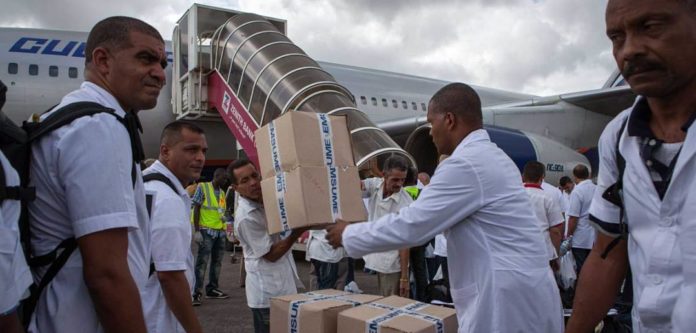
The first members of a team of 165 Cuban doctors and health workers unload boxes of medicines and medical material from a plane upon their arrival at Freetown’s airport to help the fight against Ebola in Sierra Leone.
A member of the 165-member medical team Cuba sent to fight Ebola in Sierra Leone has been diagnosed with the deadly disease, according to state media.
Dr. Felix Baez Sarria is being treated by British doctors in Africa but he will be transferred to a special unit in Geneva at the recommendation of the World Health Organization, Cuban state media said, citing a Health Ministry statement.
Cuba has won global praise for sending at least 256 medical workers to Sierra Leone, Liberia and Guinea to help treat Ebola patients. State officials have emphasized the medics’ high state of readiness for the mission, saying the doctors, nurses and support staff received weeks of instruction in protective measures and equipment.
Once in Africa, the Cuban teams got two to three weeks of additional training before heading into the field. They were to be quarantined in Africa for three weeks at the end of their six-month mission before returning to Cuba.
Official state website Cubadebate reported that Baez, an internal medicine specialist, came down with a fever of more than 100 degrees on Sunday and was diagnosed with Ebola the following day. He has not shown complications and is “hemodynamically stable,” the ministry statement said.

As one of the largest contributors, Cuba has sent more than 250 health workers to the three Ebola-affected countries in West Africa.
“Our collaborator is being tended to by a team of British professionals with experience in treating patients who have displayed the disease and they have maintained constant communication with our brigade,” the statement said.
Cuban officials did not say how he caught the disease or immediately release any other information about the case, the first reported among the Cuban health workers the island sent to Africa.
Early symptoms of Ebola include fever, headache, body aches, cough, stomach pain, vomiting and diarrhea, and patients aren’t contagious until those begin. The virus requires close contact with body fluids to spread so health care workers and family members caring for loved ones are most at risk.
Cuba is one of the largest global contributors of medical workers to the fight against Ebola, a commitment that has drawn rare praise from the U.S. and focused worldwide attention on the island’s unique program of medical diplomacy, which deploys armies of doctors to win friends abroad and earn billions a year in desperately needed foreign exchange. In all, Cuba has more than 50,000 health workers in 67 countries.
Ebola has killed more than 5,000 people in the west African countries of Liberia, Sierra Leone and Guinea. Currently, the disease is spreading most rapidly in Sierra Leone, where shortages of treatment beds and trained health workers are driving spikes in transmission and allowing the outbreak to take hold in new hotspots across the country.
Still recovering from years of conflict, Sierra Leone has seen at least 128 of its health personnel infected by Ebola as staff working in general wards and special treatment centers have been exposed to the disease. On Tuesday, a seventh doctor in Sierra Leone died from the virus, just days after Dr. Martin Salia, a U.S.-based surgeon infected with Ebola while working in Sierra Leone, died at at Nebraska Medical Center. In total, more than 300 doctors, nurses and other health care workers have died of the disease since the outbreak began.
